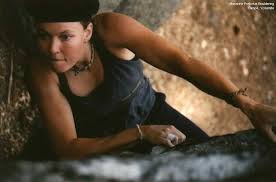Amazing South African Athletes
In 2004 she became the first woman to climb the East face of the Central Torres del Paine in Patagonia (Chile).
In February 2005 she climbed the "Compressor" route on Cerro Torre.

South African Rock Climber: CLICK to WATCH a VIDEO about Marianne Pretorius
On 21 August 2005 Marianne Pretorius, accompanied by Peter Lazarus, James Pitman and Andreas Kiefer reached the top of Trango Tower in Pakistan, becoming the third woman to step on the summit.
In February 2005 she climbed the "Compressor" route on Cerro Torre.
South African Rock Climber: CLICK to WATCH a VIDEO about Marianne Pretorius
On 21 August 2005 Marianne Pretorius, accompanied by Peter Lazarus, James Pitman and Andreas Kiefer reached the top of Trango Tower in Pakistan, becoming the third woman to step on the summit.
Willi Besters: South African Artist & Sculptor
His works are collages assembled from scraps and junk from flea markets and townships like shoes, bones, tins, newspaper clippings and metal pieces combined with oil paints and photographs.
His father was Xhosa and his mother was classified coloured by the
When he was 10 years old his family was force to move in accordance with the Group Areas Act and Besterhad to leave school to help the family economically.

One of his works was sold for £10.000 at a Sotheby´s auction in London.
South Africa´s Sarpa Salpa Fish
Etymology: Sarpa: Spanish, sarpo, sapo = toad (a toad-fish)
Salema Porgy: This fish was consumed during the Roman Empire as a recreational drug, because it produces hallucinations!
It is presently believed that the fish ingests a particular algae or phytoplancton which causes it to become hallucinogenic.
Changing the World: Swaziland´s Kids
Two teenagers from the southern African country of Swaziland have won Scientific American's inaugural Science in Action Award, part of the Google Science Fair.
The prize is awarded to a project that addresses a social, environmental or health issue to make a practical difference in the lives of a group or community.
This year's winners are both 14 years : Sakhiwe Shongwe of Siteki and Bonkhe Mahlalela of Simunye.
Their project explores an affordable way to provide hydroponics to poor subsistence farmers, enabling them to grow their crops and vegetables in very large quantities and within limited space without using soil.
Scientific American: CLicK to find how teens engineer a way to help farmers in Swaziland
The prize is awarded to a project that addresses a social, environmental or health issue to make a practical difference in the lives of a group or community.
This year's winners are both 14 years : Sakhiwe Shongwe of Siteki and Bonkhe Mahlalela of Simunye.
Their project explores an affordable way to provide hydroponics to poor subsistence farmers, enabling them to grow their crops and vegetables in very large quantities and within limited space without using soil.
Scientific American: CLicK to find how teens engineer a way to help farmers in Swaziland
Kite Spiders: South Africa
Kite spiders are diurnal Araneidae or "orb-web" spiders which means that during the process of making a web, the spider will use its own body for measurements.

Gasteracantha falcicornis
Gasterocantha sanguinolenta
These spiders are small (8-10 millimetres long), with 4 species in South Africa. The Araneidae occupies a niche not utilized by other spiders: the aerial passage amongst vegetation in the path of flying insects.
The diurnal orb web spiders continually repair their webs, usually using them for a few of days. The web cannot be used indefinitely as it dries and loses its capture ability and insects will no longer stick to it.
The diurnal orb web spiders continually repair their webs, usually using them for a few of days. The web cannot be used indefinitely as it dries and loses its capture ability and insects will no longer stick to it.
South African Mountain Bike Racing
A "natural" incident...
Subscribe to:
Posts (Atom)